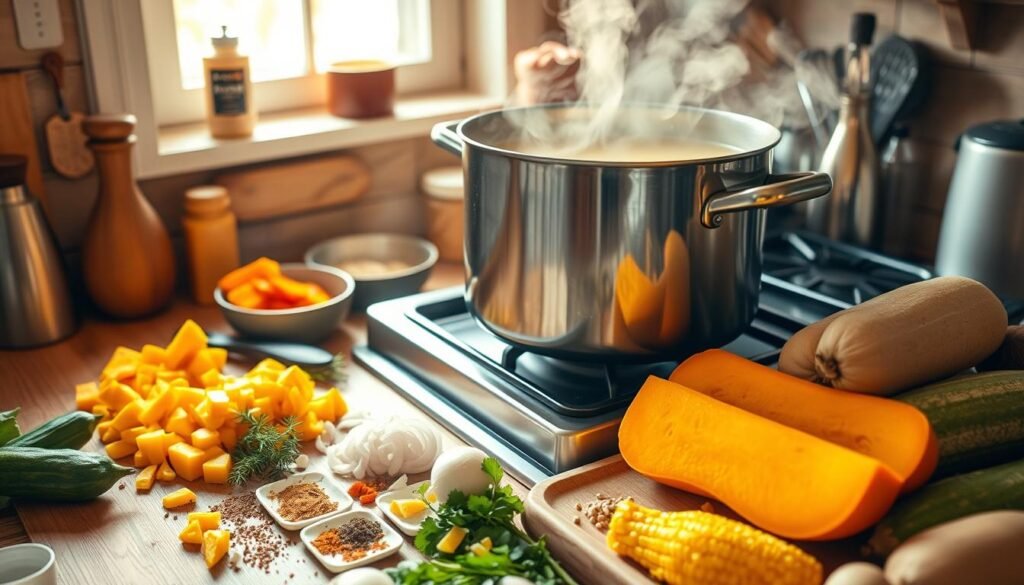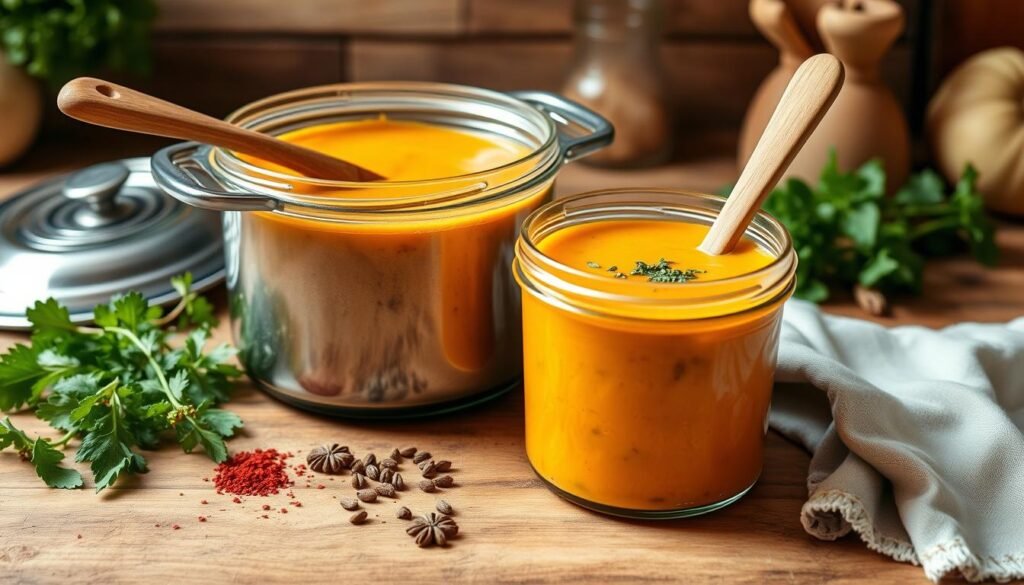As the leaves turn golden and the air crisps, there’s nothing quite like embracing the autumn season with a heartwarming bowl of Spiced Butternut Squash Soup with Sweet Corn. This cozy soup recipe combines the rich, nutty flavor of butternut squash with the natural sweetness of corn, blending into a comforting dish that’s perfect for chilly evenings.
Last fall, I vividly remember coming home after a brisk walk through Central Park, nostrils tingling with the scent of fallen leaves and a hint of distant wood smoke. All I craved was something nourishing, something that would not just warm my body, but also my spirit. What I found was this fall soup recipe that soon became a staple in my kitchen.
The prep time is simply 10 minutes, and with a cook time of 20 minutes, in just 30 minutes, you’re ready to serve up this delightful Spiced Butternut Squash Soup with Sweet Corn Recipe to your family or friends. The addition of spices not only enhances the soup’s flavor but also fills your kitchen with a warming aroma, making this recipe a perfect delight for the holiday season and beyond. Plus, it has the nutritional bonus of being rich in Vitamin A, Vitamin C, fiber, B vitamins, potassium, and more. And let’s not forget, with only 148 kcal per serving, it is as healthy as it is delectable.
Featured in admired publications like Forks Over Knives and Vegan Bowls, this soup is cherished by both experienced chefs and home cooks. It’s also wonderfully versatile—whether you pair it with a crusty artisan bread or enjoy it as a wholesome starter to a holiday meal.
For another hearty and comforting soup option, check out this chunky butternut squash sausage soup recipe. Both options will leave you feeling cozy and satisfied.
Introduction to Spiced Butternut Squash Soup
Spiced Butternut Squash Soup is a delightful and warming dish perfect for the colder months. This recipe combines the smooth, velvety texture of butternut squash with the sweet pop of corn, enriched with an array of spices. Let’s take a closer look at what makes this soup truly special and why it’s the perfect comfort food.
What Makes This Soup Special?
The best butternut squash soup recipe stands out for its simple yet enticing combination of seasonal vegetables and rich spices. Featuring star ingredients like smoked paprika, cumin, and turmeric, each spoonful brings depth and complexity without overwhelming the delicate sweetness of the butternut squash and corn. The soup’s unique flavors are developed by simmering for 30 minutes—10 minutes covered and 20 minutes uncovered—until it reaches the right consistency.
The choice of Hokkaido, Acorn Squash, or Butternut Squash as the primary ingredient contributes significantly to the dish’s unique taste. Furthermore, this homemade spiced soup can be customized with various garnishes, like a drizzle of coconut milk or a sprinkle of smoked paprika, and is easily adaptable to different cooking methods such as stovetop, Crock-Pot, or Instant Pot.
The Perfect Comfort Food
When it comes to comfort food, this best butternut squash soup is at the top of the list. Its creamy texture and robust flavors make it an ideal meal for the fall and winter months. Not only is it delicious, but it also provides a nutritious boost with each serving containing about 272 kcal. Moreover, its velvety consistency is achieved by sautéing aromatics like onions and garlic for about 5 minutes before combining with the other ingredients.
As a homemade spiced soup, it offers flexibility and room for creativity. You can add optional garnishes like cheese, nuts, or fresh herbs, or even experiment with different spice blends for a Thai, Mexican, or Chai twist. Whether you’re enjoying it on a cool evening or preparing it in advance to freeze for up to 6 months, this soup is sure to be a household favorite.
Ingredients You’ll Need
Embarking on creating this savory squash recipe means gathering some flavorful and fresh ingredients. This vegetarian soup not only promises a rich texture and taste but also a delightful cooking experience.
Fresh Produce
The core of this dish relies heavily on fresh produce. Here are the key ingredients:
- 1 medium-sized butternut squash
- 1 cup sweet corn kernels (frozen works well during winter)
- 1 large sweet onion
- Fresh thyme and rosemary
- 3 cloves of garlic
These fresh items are the foundation of our ingredients for butternut squash soup and laid the ground for a vibrant, healthy meal.
Spices and Seasonings
Adding depth to our soup involves an array of aromatic spices and seasonings:
- 2 teaspoons of smoked paprika
- 1 teaspoon of ground cumin
- 1 teaspoon of turmeric
- Pinch of cayenne pepper
- Salt, to taste
- 1½ tablespoons of olive oil or coconut oil
These spices transform a humble vegetarian soup into a robust savory squash recipe that will tantalize your taste buds.
Optional Add-Ins
Personalizing your butternut squash soup elevates the flavor and texture, making it uniquely yours:
- 1 tablespoon of apple cider vinegar for a subtle tang
- Chickpeas or shredded chicken for added protein
- Roasted red peppers for a smoky twist
- 1 cup of coconut milk for creaminess
- Garnishes like pine nuts, croutons, reduced balsamic, or fresh thyme leaves
Whether you are a purist or like a little twist in your soup, these optional add-ins offer incredible versatility.
Preparing the Butternut Squash
Starting with a firm and ripe butternut squash is essential for this recipe. Preparing butternut squash may seem daunting at first, but with a few tips, it becomes a breeze. Here’s a step-by-step guide on how to make the process more manageable.
How to Cut and Peel
First, cut off both ends of the butternut squash to create a stable base. Using a sharp vegetable peeler, carefully peel away the skin. Next, cut the squash in half lengthwise. Scoop out the seeds with a spoon and discard them. Finally, dice the squash into even cubes to ensure uniform cooking. A key part of preparing butternut squash is to make sure your knife and peeler are sharp; this will make the process safer and easier.

Roasting Techniques
Roasting the diced butternut squash enhances its natural sweetness and softens it perfectly for blending into a homemade spiced soup. Preheat your oven to 400°F (200°C) and line a baking sheet with parchment paper. Toss the squash cubes with olive oil, salt, and pepper, then spread them evenly on the baking sheet. Roast for about 25-30 minutes, or until the squash is tender and lightly caramelized. This step is crucial for developing deep, rich flavors in your homemade spiced soup.
For more details on butternut squash recipes that can elevate your Thanksgiving meal, check out this link. Roasting butternut squash not only amplifies its natural flavors but also makes it easier to blend into a smooth, creamy texture for your soup.
Cooking the Soup Base
When cooking butternut squash soup, a flavorful vegetarian soup base is essential for capturing the rich taste of this comforting dish. The process begins with sautéing aromatics, creating the foundation of the soup.
Sautéing Aromatics
Start by heating 3 tablespoons of extra virgin olive oil in a large pot over medium heat. Add two medium sweet onions, chopped, and sauté until they turn translucent. This usually takes about 5-7 minutes. Include two cloves of minced garlic, stirring for another minute or until fragrant. These aromatics are crucial in building the base flavor for the soup.

Adding Broth or Stock
Next, add the roasted butternut squash to the pot, which should have been prepared earlier at 425°F for about 45 minutes to an hour. Combine with 4 cups of vegetable broth or stock, ensuring the liquid covers the squash and aromatics. Bring the mixture to a gentle simmer, allowing it to cook for 10-12 minutes. This step helps meld the flavors and softens the squash further, making it easier to blend later on.
This method integrates a harmonious blend of aromatics and roasted squash, creating a rich vegetarian soup base that is perfect for cooking butternut squash soup. The subtle sweetness of the squash, enhanced by the savory notes of the onions and garlic, results in a satisfying, hearty soup ready for the next steps of blending and seasoning.
Flavor Enhancements
Creating the best butternut squash soup involves not just the basic ingredients but also carefully chosen enhancements that elevate the dish. By experimenting with various spice blends and incorporating sweet corn, the flavors develop a complexity that makes a delightful sweet and spicy soup.
Spice Blends I Use
The choice of spices is crucial for achieving that perfect balance of flavors. I typically use a blend of paprika, cumin, and turmeric. These spices intensify the earthy and smoky undertones of the soup, making it truly memorable. Paprika adds a sweet note, cumin offers a hint of warmth, and turmeric lends a vibrant color, making the butternut squash soup not only taste amazing but also look visually appealing.
Sweet Corn’s Role in the Soup
Sweet corn is an indispensable component that contributes both flavor and texture to this sweet and spicy soup. The natural sweetness of the corn contrasts beautifully with the savory elements, creating a harmonious balance. Additionally, the corn adds a pleasant crunch that complements the smooth, creamy texture of the blended butternut squash.

Together, these ingredients form a robust palette, ensuring every spoonful is packed with flavor. For those new to making this soup, incorporating these enhancements will certainly elevate your dish and make it the best butternut squash soup you’ve ever tasted.
Blending the Soup
Achieving the perfect texture for your creamy squash soup involves blending it to a velvety consistency. Utilizing proper blending soup techniques ensures a smooth and enjoyable dish.
Choosing the Right Blender
For a flawlessly creamy squash soup, it is essential to select the appropriate blender. A high-powered blender like a Vitamix or Blendtec will yield the best results, providing a uniform, silky texture. Alternatively, an immersion blender offers convenience by allowing you to blend directly in the cooking pot. Whichever tool you choose, make sure to blend at a high speed to eliminate any remaining chunks.

How to Achieve Creaminess
Achieving that coveted creamy texture depends on a few key blending soup techniques. Start by ensuring your cooked butternut squash and broth mixture is thoroughly heated; this helps break down the fibers for easier blending. Blend the mixture until smooth, and if needed, add a splash of coconut milk or a dollop of vegan cream cheese for an extra creamy texture. These additions will not overpower the natural flavors but will enhance the overall richness of the soup.
By following these tips, your creamy squash soup will be a hit, delivering a delightful, smooth experience in every bowl.
Adjusting Consistency
Getting the consistency just right for the perfect butternut squash soup can make all the difference between a good meal and a great one. Whether you prefer your soup thick and hearty or smooth and thin, slight adjustments can help you achieve the ideal texture.

Thicker or Thinner?
If you need to adjust soup thickness to make it less dense, gradually add more broth. This approach allows you to control the fluidity without compromising the rich flavors. If the soup is too thin, let it simmer longer to reduce the liquid and concentrate the taste. Stir regularly to avoid burning or sticking.
Tips for Perfect Texture
To achieve the perfect butternut squash soup texture, balance is key. Here are some tips:
- Add slowly: When thinning the soup, incorporate the broth in small increments, stirring constantly.
- Simmer smartly: For a thicker consistency, extend the simmering time. The longer the soup cooks, the more it will thicken as the liquid evaporates.
- Stirring: Consistent stirring ensures even texture and helps prevent uneven thickness across the batch.
These small but effective adjustments can turn your butternut squash soup into a five-star dish worthy of any dinner table.
Taste Testing and Adjustments
When crafting a spicy butternut squash soup, it’s crucial to taste test as you cook to ensure a balanced flavor profile. The inherent sweetness of butternut squash, combined with the subtle sweetness from sweet corn, provides a great foundation. By taste testing, you can decide whether the soup needs a bit more salt, a touch of sugar, or even some additional spices.
Balancing Flavors
Achieving the perfect flavor balance in soup involves adjusting the seasoning with care. For instance, adding a pinch of salt can enhance the natural sweetness of both the butternut squash and the corn. If you find the soup too sweet, a splash of lemon juice can balance it out. Remember, butternut squash is not just a good source of fiber, potassium, and vitamin A, but it’s also highly adaptable to various seasonings. Adjusting these elements can provide a well-rounded depth of flavor without overshadowing the dish’s primary ingredients.
Adding Heat with Spices
To elevate your spicy butternut squash soup, consider incorporating spices such as cayenne pepper or black pepper. These spices add a warm kick that contrasts beautifully with the creamy sweetness of the soup. For those who prefer a more pronounced heat, a dash of smoked paprika can introduce a subtle, smoky layer that complements the other flavors without being overwhelming. This step is especially important if you enjoy a generous amount of heat in your dishes.

Serving Suggestions
Serving butternut squash soup can truly elevate your meal experience. To make it even more delightful, here are some ideas for toppings and pairing suggestions.
Toppings and Garnishes
One of my favorite soup topping ideas includes a sprinkle of fresh herbs like parsley, cilantro, or sage. These herbs add a burst of flavor that complements the sweet and nutty notes of the soup. For an extra crunch, consider adding roasted nuts like pecans or walnuts, which blend nicely with the soup’s rich and earthy flavor. Other great toppings include:
- Pumpkin seeds
- Shredded Parmesan, Cheddar, or Mozzarella cheese
- A dollop of creamy elements like heavy cream or coconut cream
- A drizzle of maple syrup or honey for a touch of sweetness

Pairing with Bread
When serving butternut squash soup, I love pairing it with a piece of warm, crusty bread. The bread’s texture contrasts beautifully with the soup’s creaminess. You can opt for a simple baguette, a garlic-infused bread, or even a slice of homemade sourdough. Not only does this combination create a comforting and fulfilling meal, but it also makes for a perfect option during cold weather gatherings or a quiet evening at home. Additionally, you can serve the soup alongside a fresh salad or a protein-rich main course like roasted chicken or pork to round out the meal beautifully.
Storage Tips
Proper storage of your spiced butternut squash soup is essential to maintain its deliciousness and freshness. Below, I share my tried-and-true methods for storing butternut squash soup and reheating soup to ensure it tastes just as good as when it was first made.
Refrigeration and Freezing
When storing butternut squash soup, it’s crucial to use airtight containers. This approach keeps the soup fresh longer whether you’re refrigerating or freezing it. For refrigeration, butternut squash soup made with chicken stock lasts 4-5 days, while soup with veggie broth can stay fresh for up to a week.

For longer storage, freeze the soup in an airtight container for up to 3 months. When ready to enjoy, thaw overnight in the fridge before reheating.
Reheating for Best Results
Reheating soup correctly is just as important as storing it. I recommend using the stove over low heat, gradually bringing the soup back to temperature. Stir occasionally to prevent separation or burning. This method helps retain the soup’s creamy texture and ensures it remains flavorful.
By following these tips for storing butternut squash soup and reheating soup, you can enjoy that comforting, homemade taste whenever you desire.
Nutritional Benefits
Understanding the nutritional benefits of butternut squash and sweet corn can elevate your appreciation for this healthy soup recipe. Packed with essential vitamins and minerals, this dish offers a unique combination of health advantages.
Why Butternut Squash is a Superfood
Butternut squash is celebrated as a superfood for good reason. It’s loaded with vitamin A, which is essential for eye health and bolstering the immune system. Additionally, it provides a good dose of vitamins C and E, both known for their antioxidant properties. Furthermore, the high fiber content in butternut squash aids in digestive health, making it an excellent choice for anyone looking to improve their overall diet.
Sweet Corn’s Nutritional Profile
Sweet corn is a nutritional powerhouse, rich in folate, thiamin, and vitamin C. These vitamins are crucial for energy production, brain function, and immune defense. Sweet corn also contains valuable antioxidants that combat oxidative stress, enhancing overall well-being. Including sweet corn in this healthy soup recipe adds both flavor and nutrition, ensuring every bowl is both delicious and wholesome.
Vegan and Dairy-Free Options
Creating a comforting bowl of vegan butternut squash soup without dairy is simpler than you might think. Using plant-based alternatives, you can achieve the same creamy texture and rich flavor.
Substitutions for Cream
To craft an excellent dairy-free soup recipe, I often swap out traditional cream for plant-based options. Almond milk, soy milk, and oat milk are fantastic alternatives that retain the soup’s creaminess. Additionally, a splash of full-fat coconut milk can introduce a luscious, velvety texture that complements the sweetness of the butternut squash and corn perfectly.
Enhancing Flavor Without Dairy
Enhancing the flavor profile without relying on dairy is crucial for a satisfying vegan butternut squash soup. Incorporating nutritional yeast can add a cheesy note, while various spices like white pepper and cumin offer depth. Don’t forget the importance of fresh ingredients—aromatics like garlic and onions, and a splash of vegetable broth, elevate the overall taste.
For those who enjoy a bit of tang, including a red pepper relish with ingredients like red bell pepper and Italian parsley can add brightness and contrast to the creamy soup. If you’re eager to explore more, check out the variations and other vegan soup recipes like Curried Parsnip & Carrot Soup, and Vegan Creamy Corn Chowder for inspiration on evolving your culinary creations.
Creative Variations
When it comes to spiced butternut squash soup, the possibilities are endless. I love playing around with creative soup variations to keep things fresh and exciting. One way to diversify the recipe is by incorporating other vegetables. Adding kale or spinach not only brings a vibrant color to the soup but also boosts its nutritional value.
Adding Other Vegetables
To make the soup even more wholesome, I often toss in extra veggies like carrots, bell peppers, and celery. These additions not only enhance the flavor but also contribute to the overall texture and heartiness of the soup. Roasting the vegetables before adding them can give a deeper, more complex taste.
Experimenting with Proteins
For those looking to increase the protein content, adding protein to soup is a great option. I sometimes use tofu, shrimp, or even cooked chicken for a protein-packed meal. This makes the soup suitable for various dietary needs and can turn it into a more filling dish. Experimenting with different proteins can offer new and interesting flavor profiles.
These variations not only keep the soup exciting but also cater to a wide range of tastes and preferences, making it a versatile dish for any occasion.
Perfecting Your Technique
Achieving the perfect butternut squash soup is an art that demands both attention to detail and a desire to learn from each culinary experience. Here, I’ll share my personal insights on perfecting the cooking technique for this comforting dish, alongside some common cooking mistakes to avoid for the best results.
Common Mistakes to Avoid
When perfecting soup cooking technique, some common cooking mistakes can significantly impact the final outcome. Here are a few pitfalls to be mindful of:
- Underseasoning: A lack of seasoning can make your soup taste bland. Always add salt, pepper, and consider a pinch of ground cumin or nutmeg for extra depth. Don’t forget to taste test during cooking.
- Overcooking the Squash: Roasting butternut squash at 400°F (200°C) for 25-30 minutes ensures it becomes tender and caramelized. Overcooking can result in a mushy texture, so keep an eye on the roasting time.
- Improper Blending: To achieve a smooth and creamy soup, blend the mixture thoroughly. Select a high-quality blender that can handle the job efficiently without leaving lumps.
Learning from My Mistakes
I understand the importance of perfecting soup cooking technique because I’ve encountered many common cooking mistakes myself. Here’s how you can learn from my experience:
- Timing and Temperature Control: Simmering the soup for 10-15 minutes melds the flavors beautifully, while excess cooking can dull the vibrant taste. Monitoring cooking time is crucial.
- Consistency Adjustments: If your soup is too thick, gradually add vegetable broth until the desired consistency is reached. Conversely, let it simmer longer if it’s too thin.
- Storage and Reheating: This soup can be stored in an airtight container in the fridge for up to four days or frozen for up to three months. Reheat slowly on the stove or in the microwave, stirring until hot.
With these tips, you can avoid common cooking mistakes and focus on perfecting soup cooking technique, resulting in a delicious, velvety butternut squash soup every time.
Conclusion
As we wrap up this culinary journey, I welcome you to share your experiences and unique takes on this Spiced Butternut Squash Soup with Sweet Corn. The joy of sharing soup recipes lies in the community it fosters and the personal soup preferences that emerge along the way. Whether you’ve added a splash of lime juice for a Thai twist or opted for a thicker consistency by reducing the broth, every variation adds a personal touch to a beloved dish.
Share Your Experience
There’s something truly heartwarming about hearing how others enjoy and adapt this soup. Did you find a new favorite topping or substitute an ingredient that perfectly matched your taste? Perhaps you tried storing or freezing leftover soup for a busy day and it became a lifesaver. Sharing soup recipes and your personal soup preferences not only help others but also keep the tradition alive. Please, share your thoughts and tweaks; they are always a source of inspiration.
My Favorite Way to Enjoy This Soup
Personally, my favorite way to savor this delightful Spiced Butternut Squash Soup with Sweet Corn is curled up beside the fireplace, wrapped in a cozy blanket, and accompanied by a good book. The velvety texture, slightly sweet and spicy flavor of the soup, embodies the essence of comfort food. I find that a sprinkle of fresh cilantro and a dash of coconut cream elevate the experience, making it even more special.
This recipe offers a wonderful balance of nutrition and comfort, with only 142 calories per serving and a wealth of vitamins. It’s these little moments, enjoying a hearty bowl of this soup, that make cooking such a fulfilling endeavor. I look forward to hearing how you make this recipe your own and the memories you create with it.
